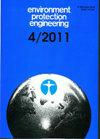缓解向约旦安曼泵送迪西水的水垢问题
IF 0.4
4区 环境科学与生态学
Q4 ENGINEERING, ENVIRONMENTAL
引用次数: 5
摘要
已知有各种方法可以减轻或防止管道中结垢的形成,而不是通过化学添加,例如抗结垢物质,或物理方法,包括超声波或纳滤(NF)。纳滤膜对多价带电离子具有选择性,单价离子只能部分通过,而多价离子则被完全拒绝。为了防止水垢的形成,化学添加是基于水的参数,如pH值、碱度和形成水垢晶体的构建单元的离子浓度。为了减轻从迪西含水层向安曼市输送的水沿其345公里管道的结垢趋势,利用模拟管道系统进行了不同的研究。这一部分的研究涉及使用纳滤和添加化学物质来减缓水垢。纳滤可去除70.5%的Ca2+、71.98%的Mg2+、7.72%的K+、29.0%的Na+、66.63%的Cl -、86.51%的NO3、85.72%的SO4和69.85%的CO2。增加Na+、K+、Cl等离子的浓度,使其保持在允许的限度内,对阻垢效果较好。本文章由计算机程序翻译,如有差异,请以英文原文为准。
Mitigation of scale problem in the pumped Disi water to Amman, Jordan
Various methods are known to mitigate or prevent scale formation in pipes, rather by chemical addition, e.g., anti-scaling substances, or physically which includes ultrasonic or nanofiltration (NF). Nanofiltration membranes have a selectivity for the multivalent charged ions, so monovalent ions will pass the membrane partly and multivalent ions will be rejected completely. Chemical addition to prevent scale formation is based on justifying water parameters such as pH, alkalinity, and concentrations of ions that form the building units of scale crystal. In order to mitigate the scaling tendency in water pumped from the Disi aquifer to Amman city along its 345 km pipeline, different studies were conducted using simulated plumbing system. This part of the study is concerned with scale mitigation using nanofiltration and addition of chemicals. Nanofiltration was applied to reduce the hardness that causes scale deposition where it rejected around 70.5% of Ca2+, 71.98% Mg2+, 7.72% K+, 29.0% Na+, 66.63% Cl–, 86.51% NO3, 85.72% SO4, and 69.85% CO2. Increasing the concentration of some ions such as Na+, K+ and Cl– keeping the allowable limit gave good results for scale mitigation.
求助全文
通过发布文献求助,成功后即可免费获取论文全文。
去求助
来源期刊

Environment Protection Engineering
环境科学-工程:环境
CiteScore
0.80
自引率
0.00%
发文量
9
审稿时长
12 months
期刊介绍:
Water purification, wastewater treatment, water reuse, solid waste disposal, gas emission abatement, systems of water and air pollution control, soil remediation.
 求助内容:
求助内容: 应助结果提醒方式:
应助结果提醒方式:


